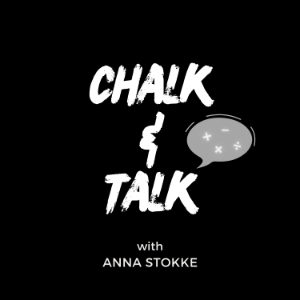
Chalk & Talk
Education Podcasts
Everyone wants to see children and young adults succeed in math, but it can be difficult to sort myths from facts in education. Join math professor, Anna Stokke, for conversations with leading educators and researchers about the importance of math, effective teaching methods, and debunking common myths about math and teaching. Chalk & Talk is a podcast for anyone interested in education, including educators, parents, and students.
Location:
Canada
Genres:
Education Podcasts
Description:
Everyone wants to see children and young adults succeed in math, but it can be difficult to sort myths from facts in education. Join math professor, Anna Stokke, for conversations with leading educators and researchers about the importance of math, effective teaching methods, and debunking common myths about math and teaching. Chalk & Talk is a podcast for anyone interested in education, including educators, parents, and students.
Twitter:
@rastokke37
Language:
English
Teaching math so students learn with Craig Barton (Ep 63)
Duration:01:15:19
Why more classroom technology is making students learn less (Ep 62)
Duration:01:11:23
Why students struggle in math and how to fix it with Barbara Oakley and John Mighton (Ep 61)
Duration:01:08:10
Rebuilding teacher training through cognitive science with Jonas Linderoth (Ep 60)
Duration:00:52:17
Why reading became a human rights issue in Canada with George Georgiou (Ep 59)
Duration:01:12:50
When a mathematician became education minister: Nuno Crato on transforming education (Ep 58)
Duration:01:06:39
Top takeaways from Anita Archer on explicit instruction (abridged version of Ep 57)
Duration:00:32:21
The power of explicit instruction with Anita Archer (Ep 57)
Duration:01:17:56
Episode 56: Unmasking instructional illusions with Paul Kirschner, Carl Hendrick and Jim Heal
Duration:01:13:50
Mailbag: How to get started with evidence-based math instruction & tackle gaps with Jonathan Regino (Ep 55)
Duration:01:02:06
Balanced literacy didn’t work—will balanced math? with Ben Solomon (Ep 54)
Duration:01:09:54
Using the Instructional Hierarchy to teach math with Brendan Lee (Ep 53)
Duration:01:03:11
The case for practice and the power of Math Corps with Alex Kontorovich (Ep 52)
Duration:01:16:37
Rocking the times tables with Bruno Reddy
Duration:00:59:37
Universal screening in math with Amanda VanDerHeyden (Ep 50)
Duration:00:53:55
From decline to top rankings: How England transformed education with Nick Gibb (Ep 49)
Duration:01:19:18
How we learn: Naive, purposeful, and deliberate practice with Stephen Chew (Ep 48)
Duration:00:57:13
Mailbag: Math facts vs calculators, a logic problem, the Southern surge (Ep 47)
Duration:00:14:49
Reclaiming learning time to boost literacy and numeracy with Ross Fox (Ep 46)
Duration:01:13:17
A decade of decline: examining falling test scores with Mike Petrilli (Ep 45)
Duration:00:59:36